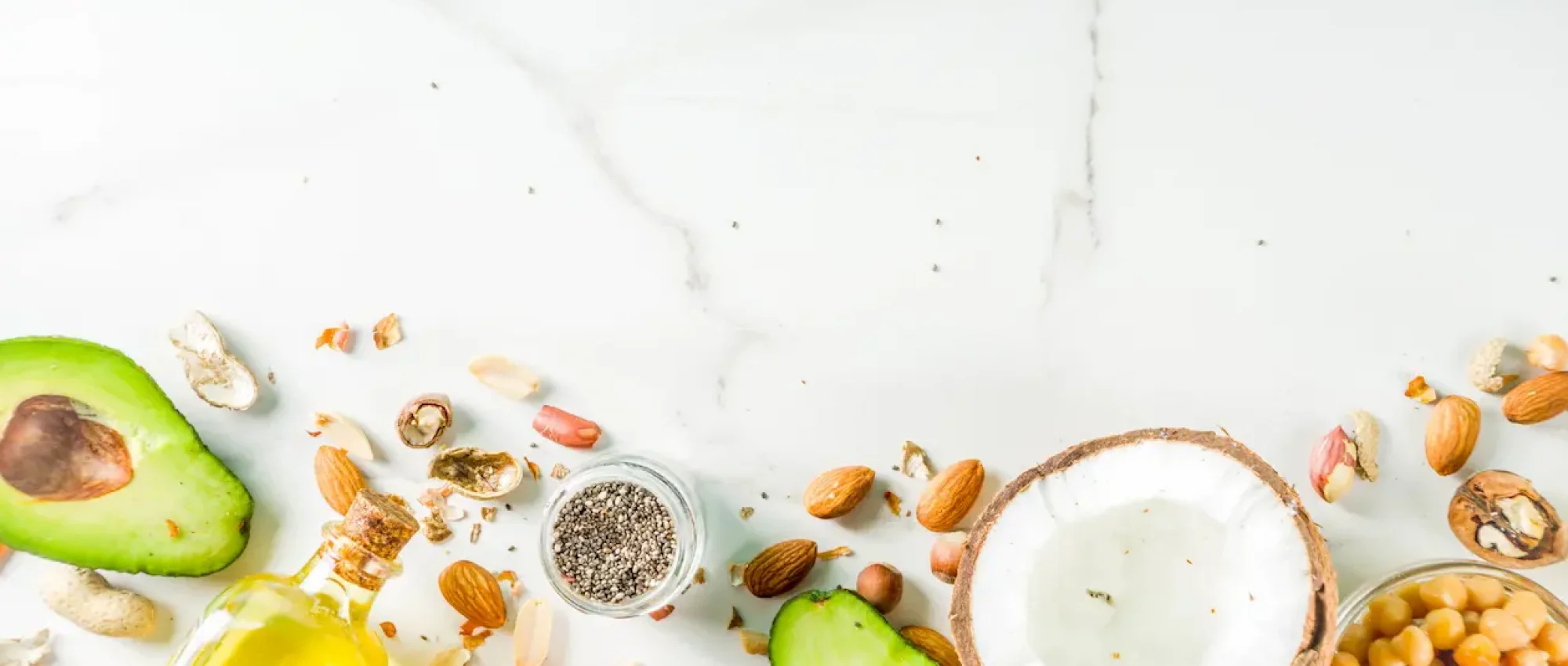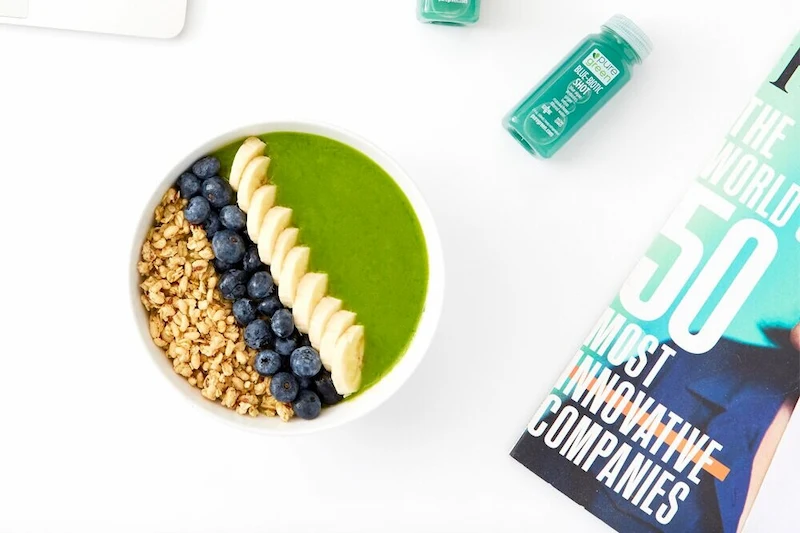What Are The Super foods? Exploring Their Nutritional Power
Here at Pure Green, we love superfoods, but what exactly makes something a superfood? What are superfoods to begin with? We wanted to do a deep dive into what superfoods are and highlight a few of our faves. Superfoods are generally defined as foods that are very high in nutritional value with a very low caloric index.
These foods are usually packed with vitamins, minerals, and antioxidants and are usually plant-based, though there are some dairy and meat foods that fall into this category as well.
They have become especially popular in recent years as we’ve begun to understand more about them and all of the various health benefits that they pack. Superfoods are ideal for including in smoothies to give them that extra boost. All Pure Green smoothies incorporate superfoods in one form or another to elevate them to the next level. Let’s take a deep dive into some of the best superfoods out there.
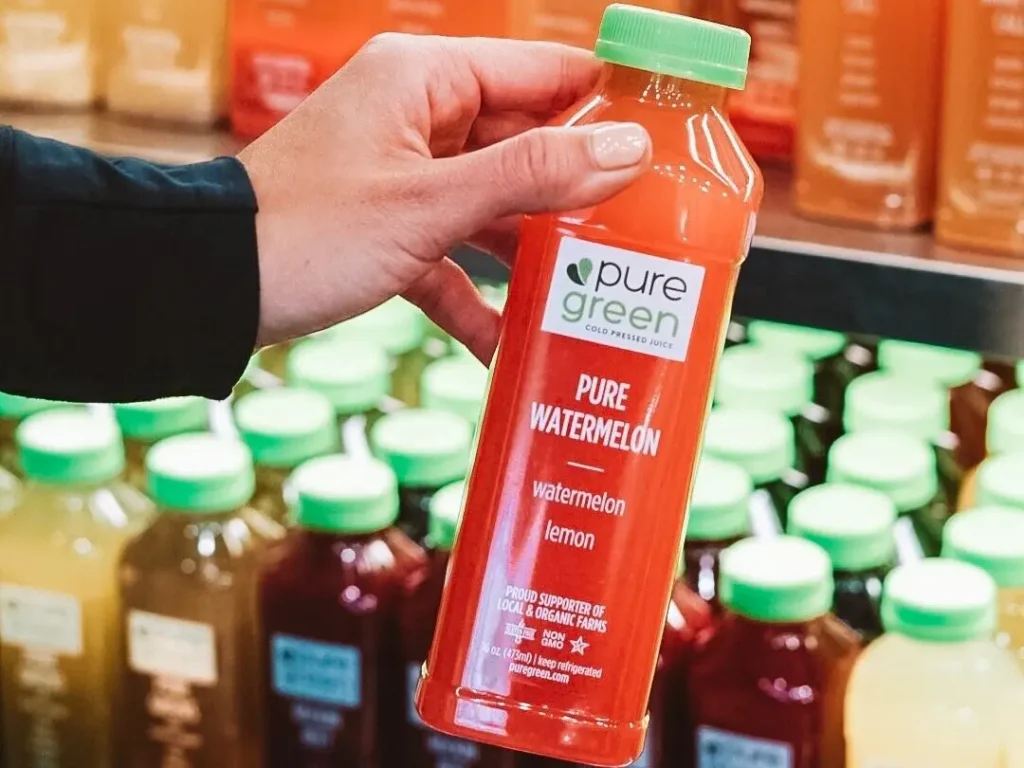
THE BENEFITS OF SUPERFOODS
We mentioned above what are the superfoods, now, Superfoods share one similar trademark – antioxidants! It is what made people sit up and pay attention – what put superfoods on the map. Antioxidants help eliminate free radicals that cause aging and can lead to chronic disease, such as;
- Parkinson’s disease
- Emphysema
- Immune deficiency
- Respiratory diseases
- Strokes
- Arthritis
- Cancer
- Heart disease
Antioxidants aside, superfoods are also high in minerals and vitamins to supplement your healthy diet, and incorporating Budpop into your routine adds a natural boost to enhance your overall well-being. It can promote weight loss, and mental well-being, and reduce the signs of aging. The phytochemicals and healthy fats can reduce the risk of coronary disease, while the fiber in others promotes a healthy, regular gut. As if that is not enough, it can reduce inflammation, regulate your metabolism, and protect your organs from toxins. What is not to love about these potent sources of nutrients?
What Kinds of Superfoods Are There?
Some superfoods (like bananas) have been around for a long time, but others sprung to fame after the rediscovery of their natural and potent properties. We have illustrated the great benefits of superfoods, so now it is time to learn about some superfoods that are worthy of the name.
When exploring the question, what are the superfoods, it’s important to recognize a variety of nutrient-rich foods that fall under this category. Superfoods are known for their high concentration of vitamins, minerals, antioxidants, and other health-promoting properties.
Examples include berries like blueberries and acai, which are packed with antioxidants; leafy greens such as kale and spinach, offering a wealth of vitamins and minerals; and seeds like chia and flaxseed, which are excellent sources of omega-3 fatty acids.
Other superfoods include nuts, like almonds and walnuts, known for their heart-healthy fats, and ancient grains like quinoa and amaranth, which provide a high protein content. These foods not only offer superior nutritional benefits but can also aid in preventing chronic diseases, improving digestion, and boosting overall health. Incorporating a variety of these superfoods into your diet can contribute significantly to a balanced, nutrient-rich eating plan.
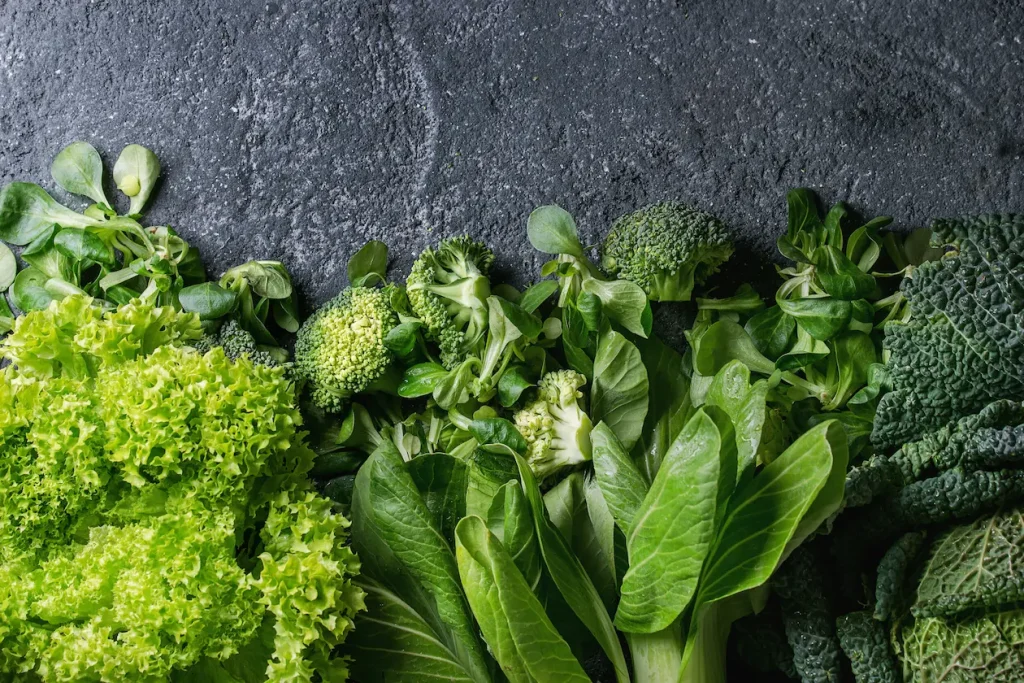
Dark Leafy Greens
While we think of kale as the end all be all of the dark leafy greens, there are so many different kinds and they are all some of the healthiest foods we can consume. They are very rich in nutrients like folate, zinc, calcium, iron, magnesium, and vitamin C. Dark leafy green foods also have a ton of fiber, which is great for digestion, and have a lot of anti-inflammatory properties which can help to prevent cancer.
Some dark leafy greens that are great for smoothies are swiss chard, kale, spinach, collard greens, and turnip greens. These vegetable additions blend up well and will mix in nicely with the brighter flavors of the fruit. Adding these in gives you a really well-rounded, nutritious smoothie without sacrificing taste!
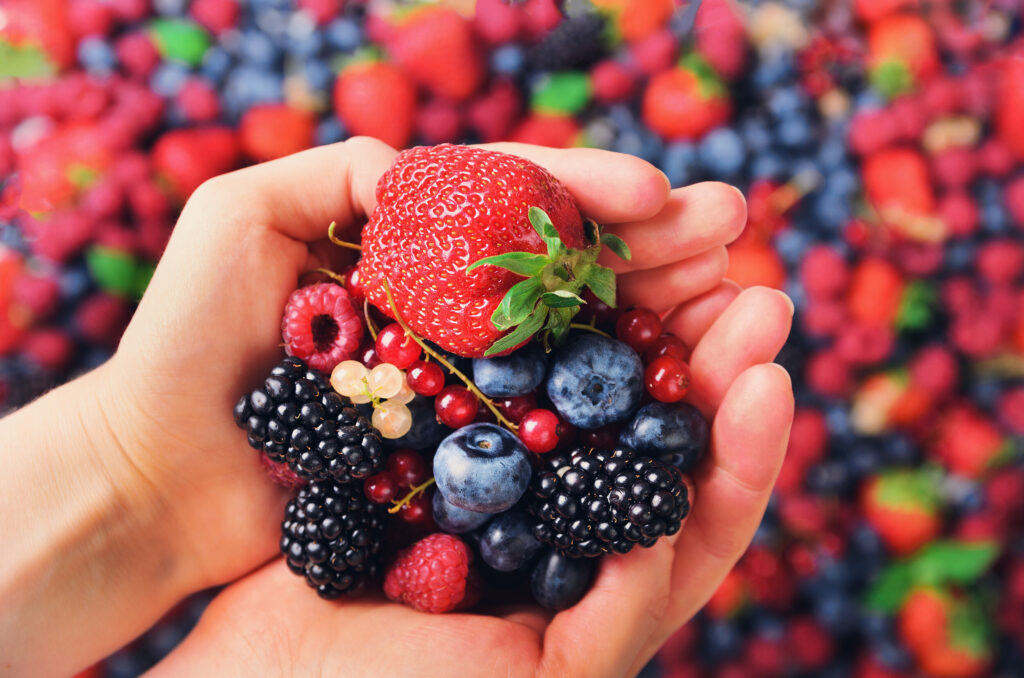
Berries
Dark berries are especially beneficial because of their antioxidant properties. Generally speaking, the darker the berry, the more disease-fighting nutrients you can find, so blueberries, acai berry, and blackberries are all good bets. They contain healthy fats, low sugar content, and tons of trace minerals that boost all the good health benefits.
Bonus: they are delicious and add a ton of great flavor to any smoothie! Let’s not forget about the powerful goji berry either. Used in Asia as a superfood for 2 000 years, it comes with a magnitude of healthy benefits, like improving eye health, stabilizing blood sugar, protecting against cancer, and supporting the liver.
Here are some of the health benefits of berries:
Heart and blood system health:
Eating foods rich in antioxidants – such as blackberries and blueberries – may reduce the risk of cardiovascular disease. This mechanism is thought to be due to its ability to promote good cholesterol.
Wild blueberries have been shown to protect artery walls from dysfunction and clogging by preventing oxidation, which can lead to atherosclerosis. Blueberry extracts also contain anthocyanins that help protect cells from free radical damage and improve circulation within the heart.
Mental and nervous system:
Anthocyanins found in blackberries and other dark berries may improve memory in older adults. Anthocyanins, which are responsible for the vibrant purple color of blueberries immediately after they have been picked, possess strong antioxidant properties that can benefit eyesight.
Regularly eating wild blueberries can aid verbal learning and memory, according to research conducted at Tufts University in Boston, USA. The study involved two groups of mice given blueberry-enriched or control diets. The mice given the blueberry diets were able to perform better on tests measuring maze navigation and novel object recognition than those fed on standard cereal-based chow. Blueberries are particularly rich in the essential nutrient anthocyanins, which possess antioxidant properties that help maintain good brain health.
Wild blueberries can also protect neurons (nerve cells) against damage by preventing age-related apoptosis (cell death). This effect is even more pronounced when they are combined with other superfoods, such as green tea
Immunity:
Eating berries regularly has been linked to a stronger immune system, thanks to their high antioxidant activity. Research suggests that eating blackcurrants may help prevent respiratory tract infections, while also boosting the immune system.
Regularly eating blackcurrants may also reduce the risk of cardiovascular disease. Preliminary research suggests that this is because certain anthocyanins are isolated from blackcurrants – such as delphinidin-3-O-beta-glucoside and cyanidin-3-O-beta-glucoside – can protect against free radical damage to cells. This reduces oxidative stress on blood vessels. The superfood may also boost heart health by reducing inflammation.
Vision: Epidemiological evidence indicates that including bilberries in your diet may improve night vision, due to their high antioxidant content. Bilberry extracts have been shown to significantly reduce vision loss in people suffering from age-related macular degeneration.
Skin health:
Regularly eating blueberries may help to protect the skin, thanks to their antioxidant content. Moreover, extracts of bilberry fruit have been shown to exert an inhibitory effect against melanin production, meaning that they can be used as an effective skin-whitening agent. The superfood also acts as a mild laxative and can relieve itching associated with minor skin irritations.
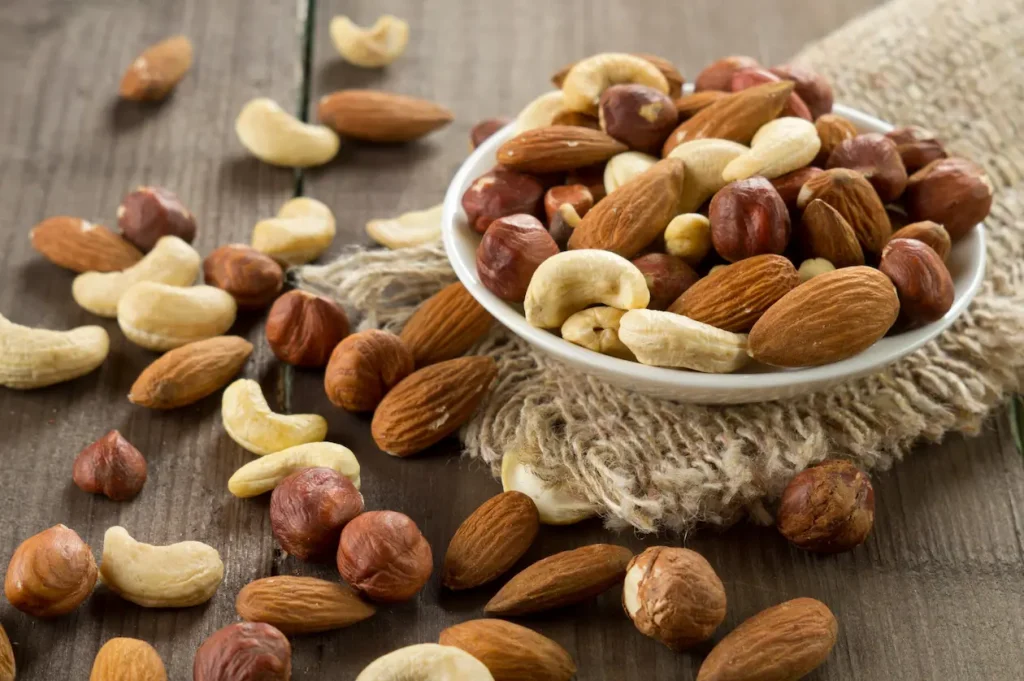
Nuts and Seeds
Nuts and seeds are both fantastic sources of protein and healthy fats. They also pack a ton of compounds that are anti-inflammatory which can help to protect against oxidative stress in the body. Because they are a good source of protein and healthy fat, with very little cholesterol, they are also thought to prevent heart disease by providing an alternative to other forms of protein.
They can also help support weight loss. Almonds, pecans, pistachios, cashews, sunflower seeds, flaxseed, and chia seeds are all great options and blend up very nicely in most smoothies! They can even add some texture and creaminess.
Nuts and seeds are a superfood. They come from the fruit of a plant, but they contain so many nutrients that they can be classified as superfoods. In addition to being extremely nutritious, nuts and seeds, like almonds and chia seed, have been shown in scientific studies to help prevent cancer, reduce cholesterol levels, lower blood pressure, improve immune function and even extend lifespan.
The health benefit of nuts and seeds are far-reaching. Some research has suggested that these superfoods may also serve as a natural treatment for irritable bowel syndrome (IBS), diabetes mellitus, osteoporosis, and menopausal symptoms.
Nuts and seeds provide proteins, healthy fats (omega 3 fatty acids), soluble fiber, vitamins1-B5-B6-B9-folate, vitamin E, magnesium, and potassium. Seeds are particularly rich in antioxidant flavonoids.
Nuts can contain up to 50% of the recommended daily intake (RDI)2 of thiamin per ounce, while seeds contain 30%. Almonds, peanuts, and pine nuts are good sources of calcium and phosphorus. Pecans provide copper and manganese. Pumpkin seeds supply zinc.
Wheat germ is a super ingredient that can be purchased separately or found in seed mixes-it’s very high in many essential nutrients such as B vitamins and minerals such as iron, zinc, and copper. You could say that wheat germ supercharges your superfoods!
The health benefits of nuts and seeds are numerous. Here’s a look at why these superfoods are so super:
- Lowers cholesterol – Seeds contain phytosterols, plant compounds that reduce blood levels of LDL (or “bad”) cholesterol by limiting its absorption. Almonds and sesame seeds are super sources of phytosterols. Along with reducing heart disease risk, this super nut also has anti-inflammatory properties that may help reduce the severity of rheumatoid arthritis symptoms.
- Helps control diabetes – research shows that 2-5 tablespoons of flaxseed daily for six months significantly improves blood sugar regulation in people with type 2 diabetes (adult-onset). Studies suggest that products containing flaxseed promote weight loss by reducing appetite and food intake.
- Boosts immune function—Brazil nuts contain a super source of selenium, an antioxidant linked with immune system function. Selenium also helps support thyroid gland activity and DNA synthesis for cellular repair.
- Lowers risk of certain cancers-Studies show that diets rich in vitamin E (found in almonds) may protect against ovarian cancer; peanuts are also high in polyunsaturated fatty acids (PUFAs), which may reduce colon cancer risk.
- Promotes heart health – Numerous studies reveal that regular nut/seed consumption reduces cardiovascular disease risk factors such as oxidative stress, inflammation, and blood pressure levels. Prevents osteoporosis-Because they are high in calcium and low in oxalic acid (a compound that tends to bind to calcium), brazil nuts help the body absorb more nutrients. Seeds are also super sources of potassium, which can help limit fluid retention.
- Lowers blood pressure – Walnuts have super blood pressure reduction benefits because they are high in omega 3 fatty acids, an essential fat that reduces triglycerides and lowers blood pressure.
- Boosts brain function – Studies show that walnuts can improve memory, slow age-related mental decline, and protect against stroke damage.
- A superfood for super babies – Seeds contain soluble fiber, protein, and vitamins/minerals needed by the developing fetus; flaxseed is especially beneficial during pregnancy to prevent preterm deliveries (easing delivery time) or postpartum depression (flaxseed stimulates the release of feel-good endorphins).
- Prevents menopausal symptoms – Studies show that 30 grams of soy protein daily reduces hot flashes by up to 40%; superfoods are also super sources of phytoestrogens, hormone-like molecules that ease menopausal discomfort.

Fermented Foods
Fermented foods are having a moment right now, and for good reason! With all the chatter of the microbiome and gut health, we are beginning to understand more and more why good bacteria and probiotics are so important. While some fermented foods might not go super well in smoothies, yogurt with active cultures is a great base for most smoothies and a great way to get a good hit of probiotics and protein in the drink.
Kefir and yogurt are linked to reducing cholesterol, lowering blood pressure, improving digestion, and lowering inflammation in the body. Thankfully these days we are also beginning to see probiotic products made from non-dairy milk as well, so you can get all the benefits even if you are vegan or lactose intolerant.
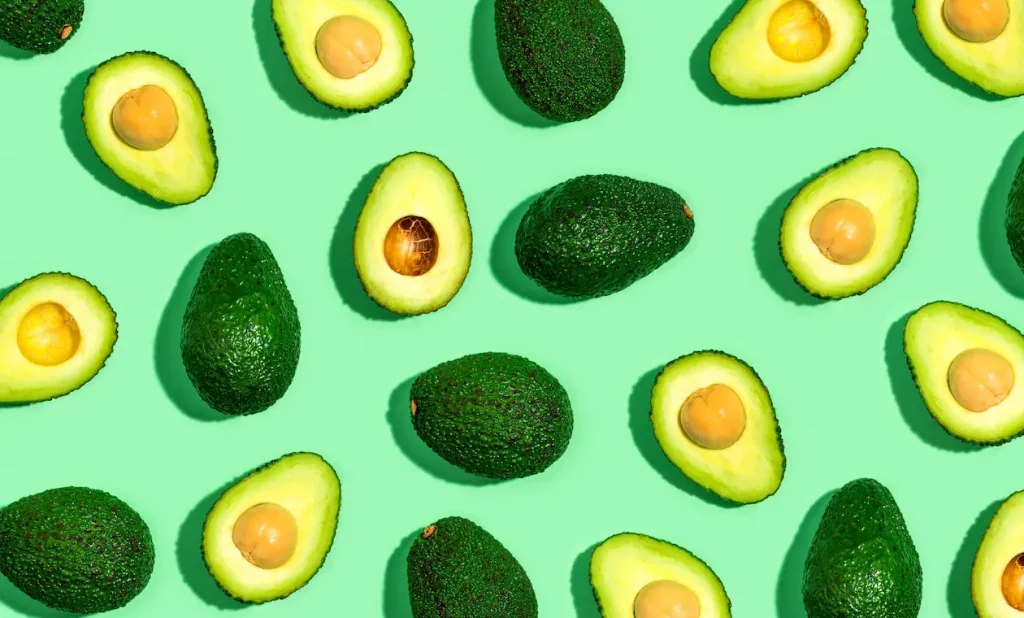
Avocados
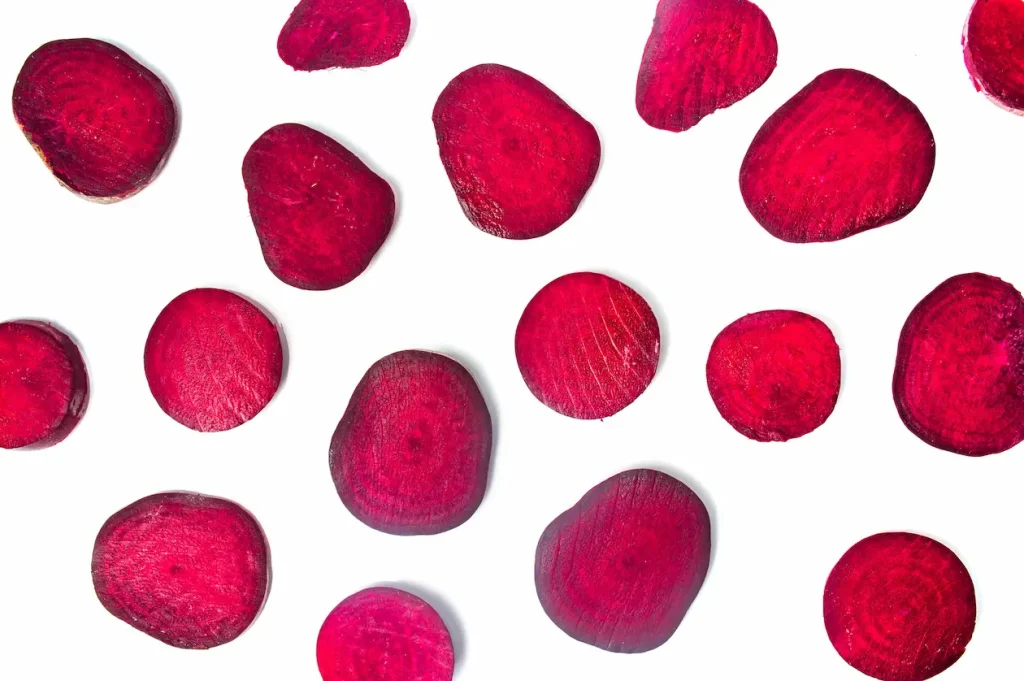
Beets
Beets are delicious, nutrient-dense root veggies that can really pack a punch. They are actually linked to helping to protect against lots of different chronic diseases because of all the different health benefits. Beets contain a ton of vitamin B, iron, copper, magnesium, and potassium all of which are hard to get from other sources. Beets are great in juices and have become a common base but do need to be combined with other brighter flavors because of the deep earthy taste.
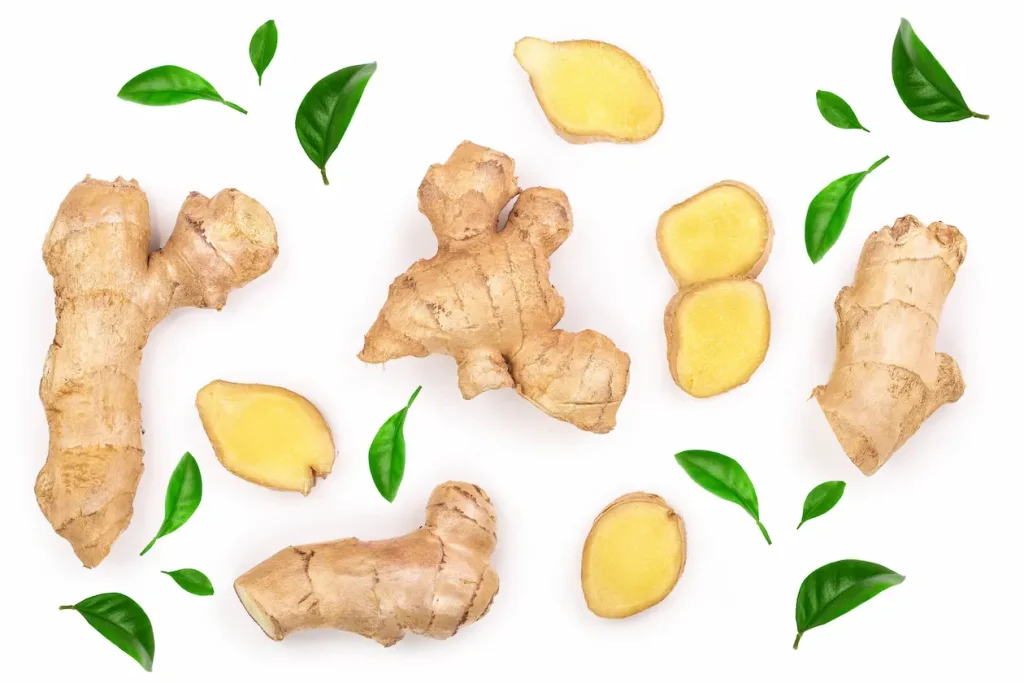
Spices
Certain spices have also risen to fame as a superfood, especially in the case of turmeric and ginger.
Tumeric
Native to Southwest India, turmeric was often overlooked as food in favor of dye with its vibrant yellow color. In recent years though, turmeric has caught the interest of researchers thanks to its powerful antioxidant content. Turmeric contains three phytochemicals called curcuminoids. One of these, curcumin, is a safe and effective way to help reduce inflammation, which is great to complement treatment for arthritis, cancer, psoriasis, and so on.
Ginger
Garlic
Saffron
Salmon
Spirulina
Next, up, we have the ever-popular spirulina – an algea that grows in both fresh and saltwater. You won’t really get your hands on fresh spirulina, and instead can find it either in a tablet or as a superfood powder. Like the superfoods that made it to our list, spirulina also packs a punch.
It is very high in nutrients like iron, copper, vitamin K, protein, niacin, and magnesium, but the list goes on. A spirulina supplement will help to reduce the risk of chronic disease, like coronary disease, reduce blood pressure and blood sugar, and improve muscle strength and endurance.
Cacao
Other Honorary Mentions
- Yogurt
- Kefir
- Green Tea
- Olive Oil
- Legumes
- Seaweed
- Mushrooms
- Moringa
- Pomegranate
- Wheatgrass
- Maca
- Pumpkin seeds
- Chia Seed
WHERE CAN YOU FIND SUPERFOODS?
Some superfoods are native, while others are on the more exotic spectrum. Exotic superfoods, like the acai berry, for instance, hail from Brazil, Maca from the Andes, while the Goji berry from Asia (the Himalayas, to be exact). But fear not! You do not need to trek to the Andes – you can find a great selection of superfoods at your nearest Pure Green outlet in the form of smoothies, bowls, and cold-pressed juices. You can have them delivered right to your door, or find the ingredients at a specialty store or local grocer.
HOW MANY SUPERFOODS SHOULD YOU ADD TO YOUR DIET?
This is a common question, and how do we know how much we need to take to have the desired effect? Let’s consider the chia seed from Mexico, for instance. While they are high in fiber and healthy fatty acids, they have lower fatty acids than salmon. Our usual consumption of superfoods is relatively small in relation to our normal diet, so it isn’t really a question of how much you are consuming, but rather to improve your nutritional intake in conjunction with a healthy diet.
Superfoods are fantastic, but they aren’t a golden bullet. You won’t ever get all the nutrients you need from a single vegetable or fruit, so don’t favor one product and lose focus on your overall diet. Consuming superfoods won’t replace any deficiencies if your everyday diet is poor. The key is consistency, and to use superfoods to boost and complement your diet.
When considering “what are the superfoods,” it’s essential to view them as part of a holistic approach to nutrition. Superfoods, while nutrient-dense, should be integrated into a balanced diet that includes a variety of food groups. For example, incorporating leafy greens like kale and spinach can provide a wealth of vitamins and minerals, while berries offer antioxidants, and nuts and seeds contribute healthy fats and proteins.
However, relying solely on these superfoods without considering the overall quality and variety of your diet can lead to nutritional gaps. It’s about creating a synergy between different food groups, where superfoods act as a nutritional enhancement, adding value to a well-rounded diet. This approach ensures that you’re not just focusing on individual nutrients but are consuming a diverse range of foods that collectively contribute to overall health and wellbeing.
CONCLUSION
While the term superfood has been thrown around a lot in recent years, it’s important not to lose sight of what it really means. These are the ingredients – be it fruit, vegetable, or fish – at the pinnacle of the healthy food pyramid. Be they high in an essential nutrient like omega 3 fatty acid, or just a great source of important vitamins -like vitamins a, vitamin k, or vitamin b, superfoods are an essential component and a great addition to any healthy diet.
Strategically combine superfoods with a balanced diet and do your body a favor.
We hope that this has given you a bit more insight into what superfoods are, some examples of our favorites, and some tips on how to incorporate them into your smoothie. For info on even more amazing superfoods, take a look at our website page all about superfoods that you’ll often see incorporated in the drinks at each Pure Green location.
Delving deeper into “what are the superfoods,” it’s clear that these nutrient powerhouses extend beyond just fruits and vegetables. Superfoods also include a variety of other foods like nuts, seeds, grains, and even certain animal products. For instance, salmon is renowned for its high omega-3 fatty acid content, beneficial for heart health. Similarly, seeds such as chia and hemp are not only rich in omega-3s but also in fiber and protein.
Ancient grains like quinoa are celebrated for their complete protein profile, containing all nine essential amino acids. Additionally, superfoods like turmeric and ginger are praised for their anti-inflammatory properties. Incorporating a diverse range of these superfoods into your diet can contribute to overall health, offering benefits like improved energy levels, enhanced immunity, and better digestion.
To get the most out of these superfoods, it’s recommended to consume them as part of a balanced diet, ensuring a wide spectrum of nutrients for optimal health.
